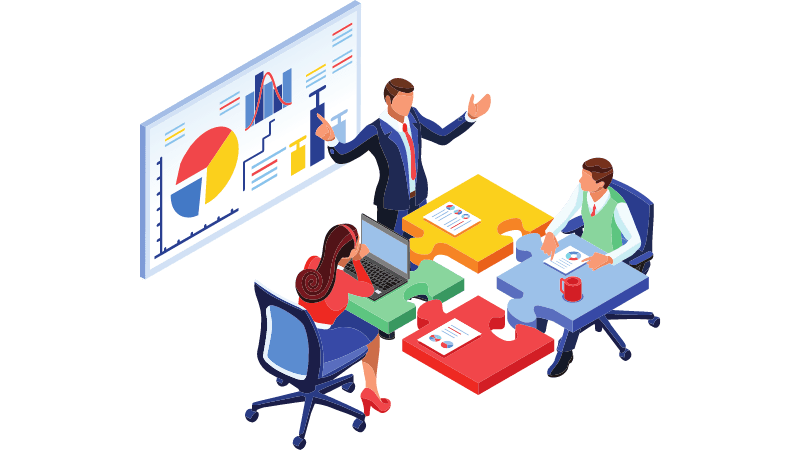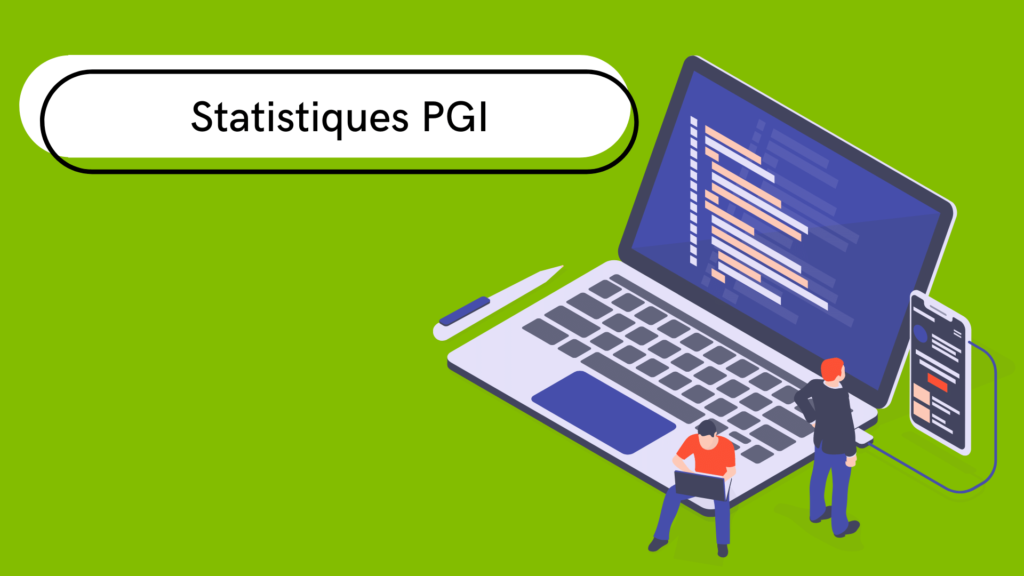According to Gartner, a leading US consulting and research company, the global ERP software market has grown by 9% to reach $39 billion by 2020.
This article is dedicated to ERP software and answers the main questions you may have about ERP.
What is an ERP? ERP definition
ERP stands for Enterprise Resource Planning.
An ERP is a software program, package or application thatautomates business management, thanks to the information it gathers from the company’s database. The data comes from the company’s various departments, such as accounting, supply chain, sales force, marketing and human resources.
Thanks to the data stored in ERP software, users, and especially managers, will gain a 360-degree view of their company’s situation. They will have a view of all departments, and this will enable them to make forecasts and analyze different possible scenarios concerning the company’s evolution. An ERP system is designed to improve company profitability and user productivity by rapidly providing all the data needed to make the right decisions.
An ERP is designed to meet a company’s specific needs, and no solution is universal. Today’s most successful companies rely on an ERP to enable them to better anticipate market changes and adapt as quickly as possible.
Today, ERP software is configured and priced according to a company’s needs, so that it can best respond to its challenges.
Why is an ERP system important?
ERP systems have become essential for companies that want to optimize the use of their resources. They can help managers and staff allocate budgets and workforces to areas that are more profitable for the company. What’s more, an ERP saves time and money without sacrificing quality or performance.
Knowing what’s going to happen before it happens is the grail for every manager. An ERP system makes it possible to anticipate the next changes in the market and easily coordinate the company’s collaborators.
Users have real-time access to inventories, sales and deliveries, for example, so they can quickly order new stock to meet new demand. Communication is also improved, with all departments having access to the same information, making it much easier to exchange information.
What’s more, all ERP signals point in one and the same direction, and employees use the same system, which makes it easier for them to understand changes and the direction they need to take.
An ERP also makes it quick and easy to format the data collected, so that analysis reports, tables and graphs can be created to illustrate what’s currently going on within the company and the market. It is this ease with which information is transmitted that managers find invaluable when they choose to use an ERP system.
Why use an ERP?
An ERP system can be used for many different purposes. Ideally, an ERP is adapted to the type of organization, size and market of the company using it.
In general, this type of software will enable the company to identify areas for improvement.
The aim of an ERP system is to bring together, in a centralized location, all the information and data relevant to the company, in order to facilitate the management of relations with the various stakeholders.
How does ERP work?
An ERP system consolidates company data. Information integrated by one department is immediately available to all other company users. Thanks to data sharing, all users have access to the same information, enabling them to be on the same wavelength.
What’s more, an ERP system makes it easy to compare 2 sites. This can give decision-makers a better understanding of why one site performs better than the other, and how they can change the way they do things to improve efficiency at both sites.
It will deliver maximum value when the company correctly divides modules between departments and guarantees data capture. Without data, it’ s useless. So the more stakeholders involved in using the software, the better the results.
Using an ERP system
How to use an ERP system
An ERP enables the company to identify concrete opportunities for improvement.
All company employees must have access to the ERP system to ensure maximum data collection and maximum efficiency.
It can, of course, be used in a variety of ways, depending on the department using it and the company’s purpose.
Who uses ERP?
All companies in all markets can use an ERP system. This software adapts to the company’s situation and is therefore highly flexible and malleable. But it’s important to choose the right one.
The more data an ERP system collects, the more it fulfills its primary objective.
The departments that use an ERP system are generally (but are not limited to) :

HR department :
An ERP enables the HR department to keep track of all employee information and current trends within the company. HR can quickly retrieve information such as an employee’s salary, history, benefits entitlements and much more. The HR department will be able to help the company’s managers more easily and effectively.
Accounting and finance department:
An ERP system enables the accounting and finance department to track and report all company transactions and financial information. An ERP will enable them to turn this information into revenue, expense and cash flow forecasts, so they can better anticipate changes.
The supply chain :
An ERP enables the supply chain to ensure a smooth, continuous flow of goods and raw materials between all stakeholders. This helps to optimize inventories, prioritize orders, minimize delivery times, avoid supply chain interruptions, and identify the best and worst performing processes.
Marketing department :
An ERP enables the marketing department to increase productivity and allocate resources to the right places, with a view to which processes are really effective and which are less so. By managing interactions and sending the right signals at the right time, marketing teams can win more customers. Automating channels by automatically managing e-mails, letters, advertisements and social networks is a considerable time-saver for this department. Reducing costs while improving conversions – that’s the goal of an ERP for the marketing department.
How to choose the right ERP software?
No ERP is universal.
All ERP systems are different, and all serve different purposes. Features that are important to you may not be important to a different market and a different size of company.
You need to carry out an analysis of your needs and objectives to determine which features and options best match your management vision for your business. Once you’ve understood your requirements and objectives, you need to make sure that it actually matches the vision you have.
Although the software you’ve found aligns perfectly with your vision, you need to think about your employees who will be using the ERP software every day. There’s no point in paying for ERP if no one wants to use it.
We advise you to choose software that is simple to use, so that it can be used by your whole team. Adoption and user experience are paramount. If your employees avoid using the software, you won’t be able to make solid decisions, since they’ll be based on only part of the data.
Having users try out the ERP software before adopting it is the best way to understand their expectations and problems. What’s more, the companies who publish the software can usually modify it to suit your teams’ requirements, so don’t hesitate to let them know if you have any questions.
Free trial periods allow you and your teams to find out if the proposed solution is right for them. You can always refuse to adopt the service if the trial is not conclusive, and try another ERP.
Anywhere, anytime?
ERP systems can offer the option of cloud Saas (online storage from a server), which means that the software is stored online, so you can access it over the Internet with your login and password.
This makes it easily accessible from a new device or location. No need to go to the office to update your data!
Using an ERP on your phone means you can access it anywhere, anytime, to view information crucial to your needs.
Read also: top 5 examples of ERP software
Benefits of ERP :
360-degree view :
An ERP system brings all information together in one place, providing precise reports on the company’s activities. This vision of the company facilitates decision-making and enables you to take the right direction.
Making money :
An ERP system can save a company money in many different ways. It automates recurring, time-consuming tasks while improving them. The insight it provides helps identify expenses that can easily be reduced.
Security and data storage :
ERP system vendors understand the fundamental importance that data has for businesses, which is why they take storage measures to prevent data loss. Cloud SaaS ERP systems use state-of-the-art security protocols to ensure that your data is secure. Storing data in the cloud also prevents employees from losing their data, should it have been misfiled.
Collaboration :
Knowing that all employees have access to the same information in real time, collaboration is much more efficient. They can discuss the same data and exchange ideas more easily, while keeping abreast of company developments thanks to the ERP system.
Capacity increase: :
A good ERP system can easily cope with the evolution of the company using it. Adding new staff or opening new departments is a simple matter. Cloud SaaS software adapts more easily to minor and major operational changes, even as the amount of data and the number of employees increase.
Flexibility :
Although an ERP helps companies to follow best practice, it also supports the company’s specific objectives and methods. Different departments will be able to use it as they see fit.
Read also: all the advantages of ERP software.
Disadvantages of ERP
Team training will certainly be necessary.
An ERP is a complex piece of software to get to grips with. Many tools are available for many different departments. It’s essential that company employees master the use of ERP software, so that they can use it as effectively as possible, and enter as much data as possible.
You'll have the information, but don't forget to apply the solutions!
Although an ERP system can find faults in the company and in sales processes, it will not implement all the solutions it proposes. Employees have to implement the solutions proposed by the ERP software, and it can’t solve problems on its own.
Let's sum up the essentials!
An ERP system is essential for companies that collect data from many different departments.
This tool must be adapted to the type of organization, size and market of the company using it.
Without data, the software is useless: convincing employees to use it is essential.
An ERP can be software installed directly on the computer or on the SaaS cloud.


